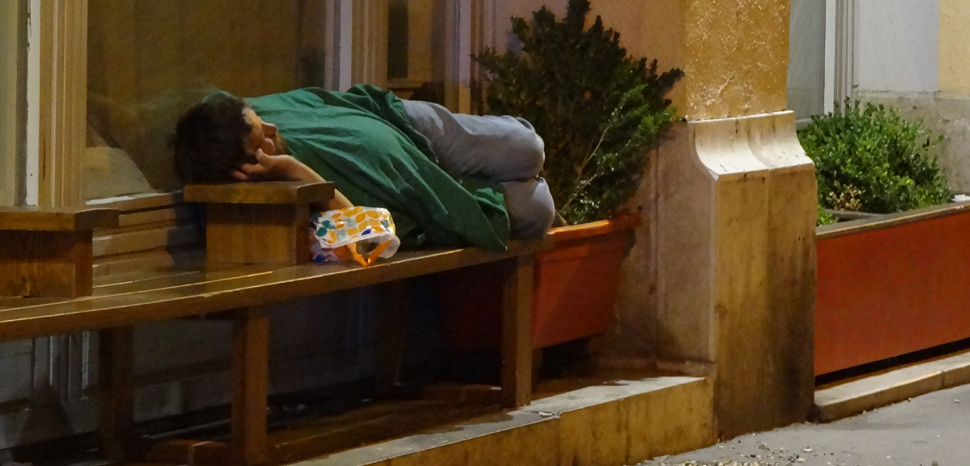Viktor Orban, Hungary’s Prime Minister and self-proclaimed defender of ‘Christian Europe’ and the continent’s Western identity, has a radical new solution to help curb the nation’s homeless problem: making it illegal. No, this isn’t a satirical attempt to emulate The Onion, it’s real.
The newly added Article 22 to Hungary’s revised Constitution, which took effect on November 19, mandates that all those who lack housing must seek refuge in a public shelter; if not, they pay a fine. If they are unable to pay the fine, they’ll face prison time. For Hungary’s estimated homeless population of around 10,000, many of whom live in urban areas like Budapest, this rather unorthodox attempt at fixing a national problem spells nothing but trouble.
But this isn’t the first time Orban’s right-wing coalition has found itself at odds with the lower classes. Since gaining power in 2010, the government has drastically curtailed union rights, crippled social welfare programs, and cut aid programs to the country’s most vulnerable.
In 2013, the government tried something similar. The Parliament adopted a law that made sleeping in a public place a criminal offense and allowed for police to fine those who do so. That law passed after a law that criminalized homelessness was reversed by Hungary’s Constitutional Court on the grounds that it violated the right to human dignity in 2012.
This latest legislation, if not designed from the beginning to be confrontational, certainly achieves that end. If, however, its motives are truly innocent of political allegiances or electoral strategy, then at the very least it reveals a concerning lack of understanding between Orban’s government and the people it claims to represent.
Orban has also passed severe restrictions on the national press and made attempts at limiting the independence of the national bank.
Many think the government’s move signals a desire to find a new political scapegoat, now that the migrant crisis has begun to settle down. “The government has realized they can’t play the migrant card endlessly because there are obviously no migrants in the country. Migration issues can still be useful for national campaigns but for local issues they need a new scapegoat,” said Gábor Iványi, a Methodist priest who runs homeless shelters in Budapest.
And there’s a reason many of the country’s homeless are apprehensive about going to public shelters. “They’re full of lice and once you get lice it’s very hard to get rid of them,” said Erik Jeczkel, a 47-year-old who has been homeless for 20 years. “The district police have beaten me up a few times. They put on gloves so they don’t leave any bruises. They try to move you on to the next district, so it’s not their problem anymore.”
Ilona Faras, who’s 55, said she had been homeless for decades, sometimes living in shelters and sometimes on the street. “I have had a number of jobs cleaning shopping centers or cafes but when I have money I’ve given it to my children. I can’t afford to rent anything,” she said.
Orban’s crackdown has garnered much international scorn, particularly from the European Union and the United Nations. Needless to say, Orban and his party’s rather unique approach to fighting poverty is definitely different. It could be called a lot of things but, so far, “effective” is not one of them.
There is of course the blatant calculation here that everyone is missing: clearly, Hungary doesn’t understand poverty, evident in the fact it has one of the worst poverty rates in the European Union. A 2017 Eurostat study found that the country had higher poverty rates than Estonia, Latvia, and Cyprus.
As much as Orban’s government has obviously failed to properly address the problem, Hungary’s poverty is intrinsically systemic. One of the main causes is the rocketing price of real estate, which mixed with the gradual devaluation of the forint, has made urban living situations extremely hard to come by.
In 2017, the average Hungarian family spent $465 a month on rent and utilities alone, leaving very little for anything else. 44% of Hungarians can’t even afford basic necessities. Not only that but as of 2017, for every 1,000 children born in the country, an average of 6.1 don’t live past their fifth birthday – a mortality rate higher than even Libya. In part, this has contributed to an overall sharp increase in government seizure of children deemed to be lacking safe living conditions.
The consistent presence of impoverished conditions throughout this eastern European country reveals not only that the national government’s efforts have persistently failed, but that either corruption is so bad it’s stopping any real progress being made in improving the lives of the people, or they simply lack a fundamental understanding of how to tackle their own problems. And it’s the citizens that are paying the price. We can all apprehend why Budapest would be so desperate to fix these issues after decades of failure, but really, who actually thinks you can cure poverty by shunning the homeless and cutting aid to the poor. This fact is obvious to bystanders; Orban and his government just doesn’t get it.
The opinions, beliefs, and viewpoints expressed by the authors are theirs alone and don’t reflect the official position of Geopoliticalmonitor.com or any other institution.
This article was originally published November 28, 2018.




